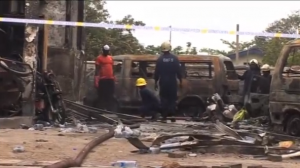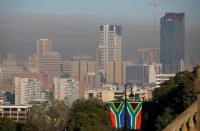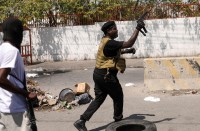
JUNE 5 (Reuters) — An explosion at a petrol station in Ghana’s capital killed around 90 people sheltering from a storm early on Thursday (June 4), emergency services said, in the worst disaster to strike the West African state in more than a decade.
The force of the blast gave few a chance to escape. People were burned beyond recognition where they stood under the station’s awning, or trapped in the charred wreckage of cars and minivans parked on its forecourt.
The accident was caused by a fire at a nearby lorry terminal. Flames spread to the state-run GOIL petrol station via spilt fuel floating on flood water, according to the fire brigade as well as people living in the neighbourhood.
“The first fire that I saw was from this place (referring to a nearby house). Later on when I was able to escape, I realised that there was something like oil, petrol or so, on the surface of the water, so I’m sure that was the catalyst that brought out the whole fire,” said Charles Ofosu Amening, an eyewitness who escaped unharmed.
It was Ghana’s worst disaster since more than 120 people died in May 2001 in a stampede at the national stadium during a football match, a police spokesman said.
The incident exposed Accra’s vulnerability to storms, given poor drainage and weak infrastructure that has failed to keep pace with population growth after years of rapid economic expansion.
Low-wage workers struggling to get home through the storm, with roads closed and minivan buses not running, formed the bulk of those caught in the explosion, witnesses said.
By morning, Ghana’s security forces had doused the flames and secured the area, pegging back anxious crowds. Rescue workers wearing face masks retrieved the remaining bodies, including that of a small child, and piled them onto a truck. Some cars were still smouldering.
Timothy Dzamesi said petrol stations should not be placed in highly populated neighbourhoods.
” “Filling stations that are being mounted in town are too much, they are too much. Where people lives, those things are not supposed to be there, especially these gas filling stations and so forth. Anything can happen. Nobody prayed that evil happens, but it happens unexpectedly, so we don’t expect these filling stations, they are too much in the town. Look at the incident that has happened. The people (victims of the explosion) are not taking good care of, which is very bad, but the filling stations are there for income to the owners, so what is the essence of these filling stations in town?,” asked Dzamesi, who took a friend who suffered severe burns in the blast to the hospital.
President John Mahama said he was heartbroken by the loss of life. He blamed the floods partly on people building homes and businesses on waterways, blocking the city’s drainage systems.
Some officials said many new Accra gas stations had sprung up without proper permits, but noted that the destroyed GOIL station had been there for years.
Ghana’s meteorological service forecast more rain on Thursday.








